
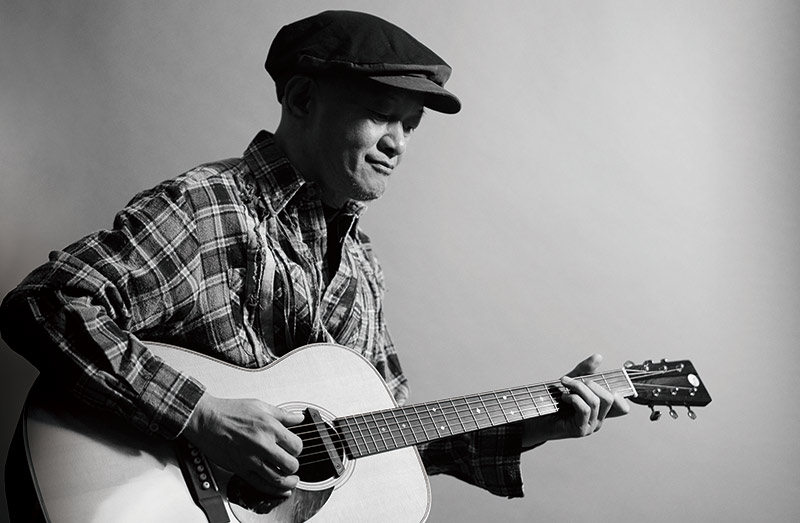
“Although I actually felt at home when I was in Yukadan, I couldn’t really do what I wanted to do…
I had my way of life. I couldn’t sing without putting my mind to it and thought that I shouldn't go back to such a‘home’unless I could enjoy it.So, I got mixed feelings when Uchida told me that he wanted to break up the band…”
I had my way of life. I couldn’t sing without putting my mind to it and thought that I shouldn't go back to such a‘home’unless I could enjoy it.So, I got mixed feelings when Uchida told me that he wanted to break up the band…”
As Kimura told me as noted, Yukadan, Japan’s leading blues band that had played a crucial role in the scene for over 20 years went silent in 1998. Atsuki Kimura was a lead vocalist of Yukadan and gained great popularity among fans. With his unique voice known as “the angel's hoarse voice”and outstanding sense of blues, he has established a high reputation as one of the best singers in Japan. When I interviewed with Keizo Shimizu, the CEO of nepenthes, I asked him whether there are any persons he admires. Shimizu answered my question and said that those are Shigeo Nagashima, a Japanese legendary baseball player, and Atsuki Kimura of Yukadan. I remember it really well because I thought he would drop some names related to the fashion world. As you may already know, nepenthes truly stands out as a fashion brand because of its quirky indie atmosphere. Having been creating unique products with distinctive aesthetic, it fascinates customers across the world. Shimizu, a father of such a brand, told me that he is a great fan of Kimura and goes to his gigs often. Therefore I became profoundly intrigued and let my imagination run with the singer while I walk down to Minami-Tatsumi Station to meet him.

Kimura was born in Ikuno ward in Osaka Prefecture of Japan. The ward is one of the typical old towns in Osaka, having a Korean town, small factories and tiny houses. Kimura still lives in the area and has never said he would move to a posh district even after he became a well known musician. “I feel really comfortable to be in the town because there are people in various generations and types - grampas, granmas, middle-aged men and women, as well as kids. You know, I made a song called ‘Osoji Obachan (A Sweeping Woman).’ I think it would not be that good if I wrote it with a man. There is such a sense in old towns,” said Kimura.
Being the fourth in the family of seven children, Kimura has loved to sing since he was a kindergartner. “My father had a guitar and I used to play it secretly. I actually learned it for about a year when I was at a junior high as my older brother paid for the course. I also learned piano with my younger sister. I think my sister who is ten years older than me had the greatest influence on my music in the early stage. She often brought me to a nearby café in which we could listen to Italian and French songs. She also had tons of vinyls and let me listen to various types of music from Latin and Jazz to Japanese pop songs by popular musicians such as Sachiko Nishida and Frank Nagai. And I remember a song by Koshiji Fubuki really well. I heard it when I had a meal together with a neighbor. I think it was ‘Sans Toi M'amie’ and it grabbed my heart.” As a child, Kimura simply accepted different types of music around him and gradually identified his preference.
Being the fourth in the family of seven children, Kimura has loved to sing since he was a kindergartner. “My father had a guitar and I used to play it secretly. I actually learned it for about a year when I was at a junior high as my older brother paid for the course. I also learned piano with my younger sister. I think my sister who is ten years older than me had the greatest influence on my music in the early stage. She often brought me to a nearby café in which we could listen to Italian and French songs. She also had tons of vinyls and let me listen to various types of music from Latin and Jazz to Japanese pop songs by popular musicians such as Sachiko Nishida and Frank Nagai. And I remember a song by Koshiji Fubuki really well. I heard it when I had a meal together with a neighbor. I think it was ‘Sans Toi M'amie’ and it grabbed my heart.” As a child, Kimura simply accepted different types of music around him and gradually identified his preference.

Although he usually got high scores on written exams for school music classes because he was learning piano and guitar, his singing skill received rather low ratings, to my surprise. Kimura thinks about the reason and said; “My voice was a bit higher than average. So I didn’t see myself as a good singer.”
Since he became a junior high school student, the Beatles, the Rolling Stones, Jimi Hendrix and Cream were his heroes of music. “There was a cool stereo system at my friend’s house. I was so surprised when we listened to the Rolling Stones’ ‘Tell Me (You're Coming Back)’ on it. The sound was really big as if the band was playing in front of me. We often gathered there to listen to rock music and play guitars together… I then decided to study art at high school because those friends complimented my drawings and recommended me to do so,” said Kimura.
While we talked, Kimura repeatedly mentioned the word ‘encounter.’ It is because; “I’m not a kind of person who makes a move first. For me, something comes naturally after an encounter with someone. I’ve been like that since early times.” He could obtain all the vital knowledge from such spontaneous encounters. “I seldom read, because I can get skills and knowledge by people around me,” he said. When I asked him what kind of child he was, he answered as follows; “I was a good, gentle kid. I used to play chess with neighbor kids.” So he has been natural, gentle and relaxed person since he was quite young. If you are a competitive person, you tend to become self-centered about everything, arming yourself with all the knowledge you can gather. Kimura is in total contrast to such an attitude. His way of life is very simple and polished just like his songs and behavior on stage.
At Osaka City Kogei High School, Kimura met Kantaro Uchida, the lead guitarist of Yukadan. “After becoming friends, Uchida and I realized that our taste of music was quite similar. Then Uchida rapidly devoted to blues and I followed him. We often brought our guitars to the school and played it in a practice room. It was like I played three chords first and then Uchida did some blues. We thought it really fun! Although it was Uchida who sang at the beginning, he asked me to sing at one time. And he heard me sing and said ‘it’s cool!’ I started to sing since then.”
Since he became a junior high school student, the Beatles, the Rolling Stones, Jimi Hendrix and Cream were his heroes of music. “There was a cool stereo system at my friend’s house. I was so surprised when we listened to the Rolling Stones’ ‘Tell Me (You're Coming Back)’ on it. The sound was really big as if the band was playing in front of me. We often gathered there to listen to rock music and play guitars together… I then decided to study art at high school because those friends complimented my drawings and recommended me to do so,” said Kimura.
While we talked, Kimura repeatedly mentioned the word ‘encounter.’ It is because; “I’m not a kind of person who makes a move first. For me, something comes naturally after an encounter with someone. I’ve been like that since early times.” He could obtain all the vital knowledge from such spontaneous encounters. “I seldom read, because I can get skills and knowledge by people around me,” he said. When I asked him what kind of child he was, he answered as follows; “I was a good, gentle kid. I used to play chess with neighbor kids.” So he has been natural, gentle and relaxed person since he was quite young. If you are a competitive person, you tend to become self-centered about everything, arming yourself with all the knowledge you can gather. Kimura is in total contrast to such an attitude. His way of life is very simple and polished just like his songs and behavior on stage.
At Osaka City Kogei High School, Kimura met Kantaro Uchida, the lead guitarist of Yukadan. “After becoming friends, Uchida and I realized that our taste of music was quite similar. Then Uchida rapidly devoted to blues and I followed him. We often brought our guitars to the school and played it in a practice room. It was like I played three chords first and then Uchida did some blues. We thought it really fun! Although it was Uchida who sang at the beginning, he asked me to sing at one time. And he heard me sing and said ‘it’s cool!’ I started to sing since then.”


The acoustic guitars which Kimura and Uchida bought for them cost only 1200yen. Uchida taught himself an open tuning and a bottleneck slide. They listened to old blues vinyls, wrote down the code by their own and sang. The two even copied gigs by B.B. King. The things they did with acoustic guitars were full of carefree, uncontrolled joy that is the basis for blues itself.
“Playing blues is not difficult, because it has only three chords. There is few rules and open. So you can enjoy it as you like. It’s all about whether you can swing. If you can swing, it means you found a thing you can truly enjoy. It wells up from deep within your body. It arbitrarily comes from your local climate or body frame. Blues is a song of life. It’s bare music.”
Such unrestricted style is the reason why Kimura’s songs are so beautiful. He never works out a set list or takes a run-through. He usually brings only a guitar for a gig and sings Japanese ballad as well as pop songs. He is free from everything and totally simple. His gigs are one-shot things without rules.
“Even if I could get a gratifying result from a gig, next one may not be so good. But, if so, I will try to make it better. If you could get good memories, you can do present things rightly.”
He always lives for the moment and is never afraid of revealing himself to the audience.
You may see him as a funny guy because he often sings while joking around with a glass of alcohol in hand. It is fun to see it, of course, but I think he had established such a style rather naturally as he tried to make each gig more enjoyable. He is so relaxed and his natural self when he sings, that the audience can easily come into his world and enjoy his gig from the heart. That’s why I feel gentleness and pride of a professional from the man.
After graduation from the high school, Kimura started to play blues at some places such as the Seibu Hall of Kyoto University, taking advantage of a blues boom in Kyoto. Also, a basist, Hanaoka, and a drummer, Shimada, joined Yukadan at that time. Then the four-piece band finally made a debut in 1975 with the forenamed song “Osoji Obachan.” Although it was the time when Japanese blues scene just started its history, Yukadan already had strong presence in it.
Their first album “Yukadan” is, without doubt, a great masterpiece because we can directly feel their fun-loving spirit. The band won out in popularity and has reigned in the scene as a completely unique group with its extraordinary performances at gigs. They had no set program for a gig and gave a 90-minute encore just after playing a 90-minute main session.
Yukadan also played at 1988 Chicago Blues Festival for the first time as a Japanese band and proved in the home of blues that Japan had such great bluesmen.
“Since not so many bands sang blues in Japanese at the moment, people thought it was foreign music. Some even reckoned it was tacky to sing it in our language. But I felt such an attitude was way more tacky. If you sing a song in your own language, you can put your soul into it. And it’d be easier for people listening to it. However, we realized that we could understand each other’s music across the language barrier, after seeing Americans enjoying our songs in Chicago. Good stuff is good for everyone. We did think so while traveling around. I also found interesting that they’ve got an open-air karaoke sort of thing there. We saw various bands playing blues everywhere in the city and thought really nice. They improvised often and seemed to enjoy playing so much.”
Although the band and its music became very much in demand by various musical events, TV and radio programs, advertisings, movies and many more, in the 90s, each members gradually found out what he really wanted to do. Kimura was no exception as he released his solo album. And they started to wonder why they had to release vinyls constantly as a band.
“We enjoyed being a member of the band at the beginning. But then we started to do it by force of habit as there were so many things to do. And we were not a kind of band which can write songs briefly. Getting close to 40 year-old, we didn’t want to sing songs we didn’t really like and wondered what we were doing. What was worse was that all of us had different point of views on such a situation because of our strong personalities…”
After graduation from the high school, Kimura started to play blues at some places such as the Seibu Hall of Kyoto University, taking advantage of a blues boom in Kyoto. Also, a basist, Hanaoka, and a drummer, Shimada, joined Yukadan at that time. Then the four-piece band finally made a debut in 1975 with the forenamed song “Osoji Obachan.” Although it was the time when Japanese blues scene just started its history, Yukadan already had strong presence in it.
Their first album “Yukadan” is, without doubt, a great masterpiece because we can directly feel their fun-loving spirit. The band won out in popularity and has reigned in the scene as a completely unique group with its extraordinary performances at gigs. They had no set program for a gig and gave a 90-minute encore just after playing a 90-minute main session.
Yukadan also played at 1988 Chicago Blues Festival for the first time as a Japanese band and proved in the home of blues that Japan had such great bluesmen.
“Since not so many bands sang blues in Japanese at the moment, people thought it was foreign music. Some even reckoned it was tacky to sing it in our language. But I felt such an attitude was way more tacky. If you sing a song in your own language, you can put your soul into it. And it’d be easier for people listening to it. However, we realized that we could understand each other’s music across the language barrier, after seeing Americans enjoying our songs in Chicago. Good stuff is good for everyone. We did think so while traveling around. I also found interesting that they’ve got an open-air karaoke sort of thing there. We saw various bands playing blues everywhere in the city and thought really nice. They improvised often and seemed to enjoy playing so much.”
Although the band and its music became very much in demand by various musical events, TV and radio programs, advertisings, movies and many more, in the 90s, each members gradually found out what he really wanted to do. Kimura was no exception as he released his solo album. And they started to wonder why they had to release vinyls constantly as a band.
“We enjoyed being a member of the band at the beginning. But then we started to do it by force of habit as there were so many things to do. And we were not a kind of band which can write songs briefly. Getting close to 40 year-old, we didn’t want to sing songs we didn’t really like and wondered what we were doing. What was worse was that all of us had different point of views on such a situation because of our strong personalities…”
So, in 1998, Yukadan suddenly went silent after staying active for over 20 years. Although Kimura’s solo career had begun since 1994, he became even more serious about seeking the basis of blues – joyful singing with a free spirit. He then started to hold more than seven gigs a month across Japan and collaborate with various musicians, as well as releasing 13 albums including both solo and past works. For a gig, he often picked strange place such as a pub, greenhouse or shrine as its venue. I think it was because he believed that he could change the atmosphere to his own taste with just a single guitar.
After a 15-year break, Yukadan began its musical activity in 2013. “All of us hasn’t changed. I think it’s really nice to have songs which we can enjoy without feeling odd,” Kimura said.
During this interview, he often mentioned about “how he enjoys the activity.” Such a way of thinking echoes that of fashion.
“I do think we should enjoy fashion just like music. When I was at school age, I wanted to wear my school cap as I liked. We also remade our school badges seem older. Personally, I don’t like to wear same things as others to express my individuality. But I didn’t like bizarre fashion either. So I rather wear grunge outfits when posh, clean clothing is in style. By doing so, I can say that I’m playing with timing. You may not want to have a good meal when you’re full, but you’ll be pleased when you’re hungry. It’s just like that. Timing is crucial when we sing and I really enjoy playing with it at the same time.”
After a 15-year break, Yukadan began its musical activity in 2013. “All of us hasn’t changed. I think it’s really nice to have songs which we can enjoy without feeling odd,” Kimura said.
During this interview, he often mentioned about “how he enjoys the activity.” Such a way of thinking echoes that of fashion.
“I do think we should enjoy fashion just like music. When I was at school age, I wanted to wear my school cap as I liked. We also remade our school badges seem older. Personally, I don’t like to wear same things as others to express my individuality. But I didn’t like bizarre fashion either. So I rather wear grunge outfits when posh, clean clothing is in style. By doing so, I can say that I’m playing with timing. You may not want to have a good meal when you’re full, but you’ll be pleased when you’re hungry. It’s just like that. Timing is crucial when we sing and I really enjoy playing with it at the same time.”
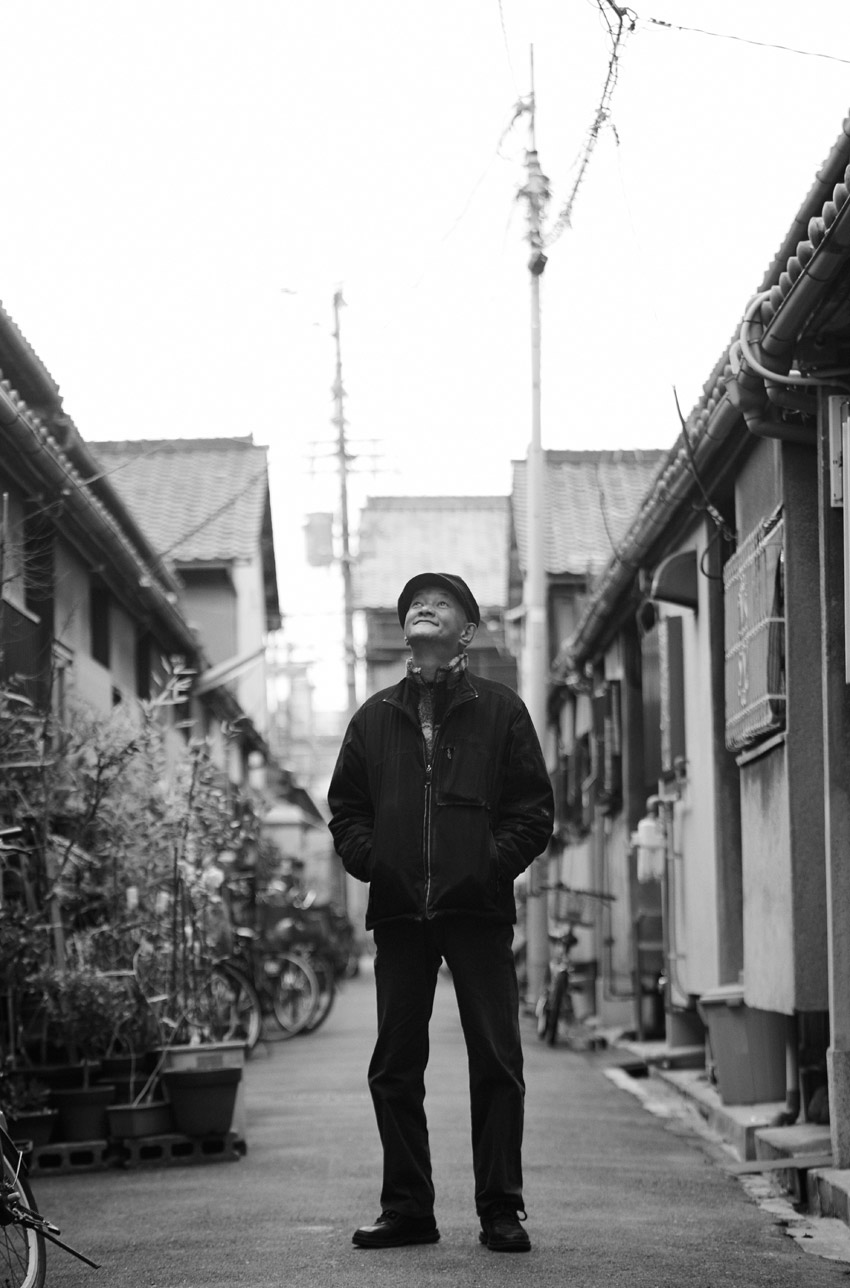
“Well it is true for early bluesmen such as Sleepy John Estes. He told me about the story when we played together. But you know, my music is made and played by me. When you listen to good music, you don’t think it’s too long or too short even it IS too long or too short. I’d like to make mine like that.” As you may realize by seeing the photos here, his eyes are so bright and his hands are exceptionally tasteful. I do feel inspired by his steady style and look forward his future activities, seeing the beauty of this bluesman before my eyes. “Oh I do my stuff as I like. So please do the same for you.”

数ある憂歌団/木村充揮作品から、
ネペンテス清水慶三の愛聴盤をピックアップ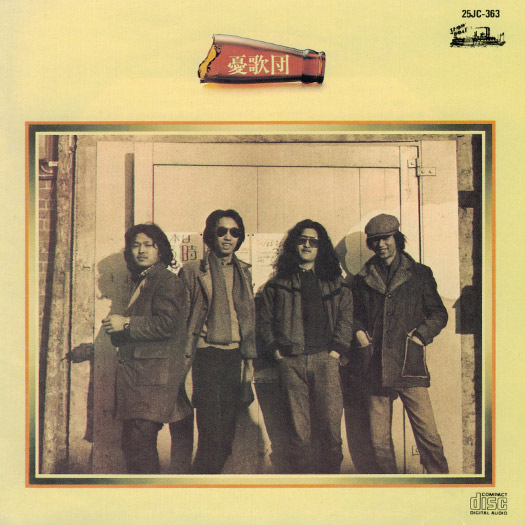 「憂歌団」
「憂歌団」
ハタチそこそことは思えない
完成度の記念すべき1stアルバム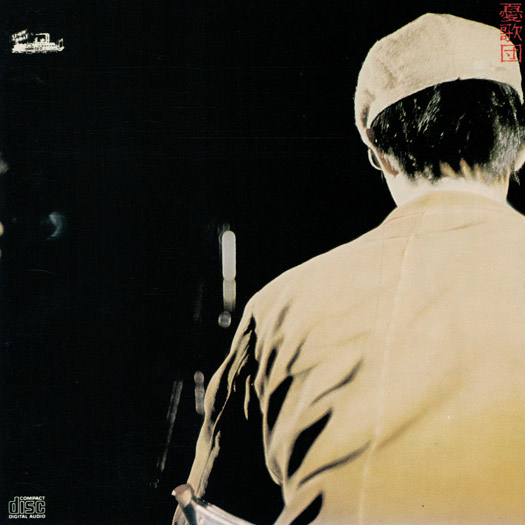 「生聞59分」
「生聞59分」
ライブバンドとしての魅力が詰まった
憂歌団の初のライブアルバム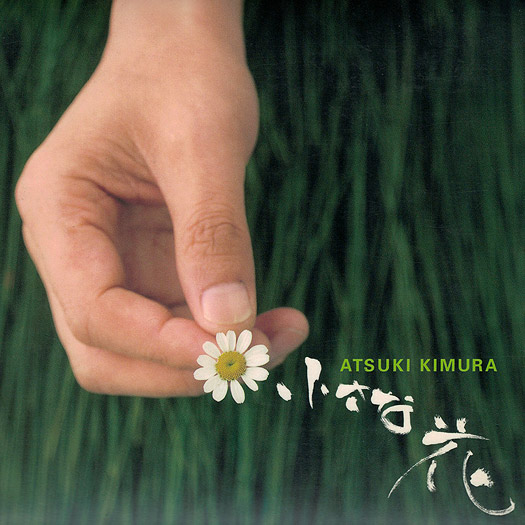 「小さな花」
「小さな花」
甲本ヒロトによる楽曲や名曲
「ケサラ」が話題となったソロアルバムnepenthes©2006.AllRightsReserved.